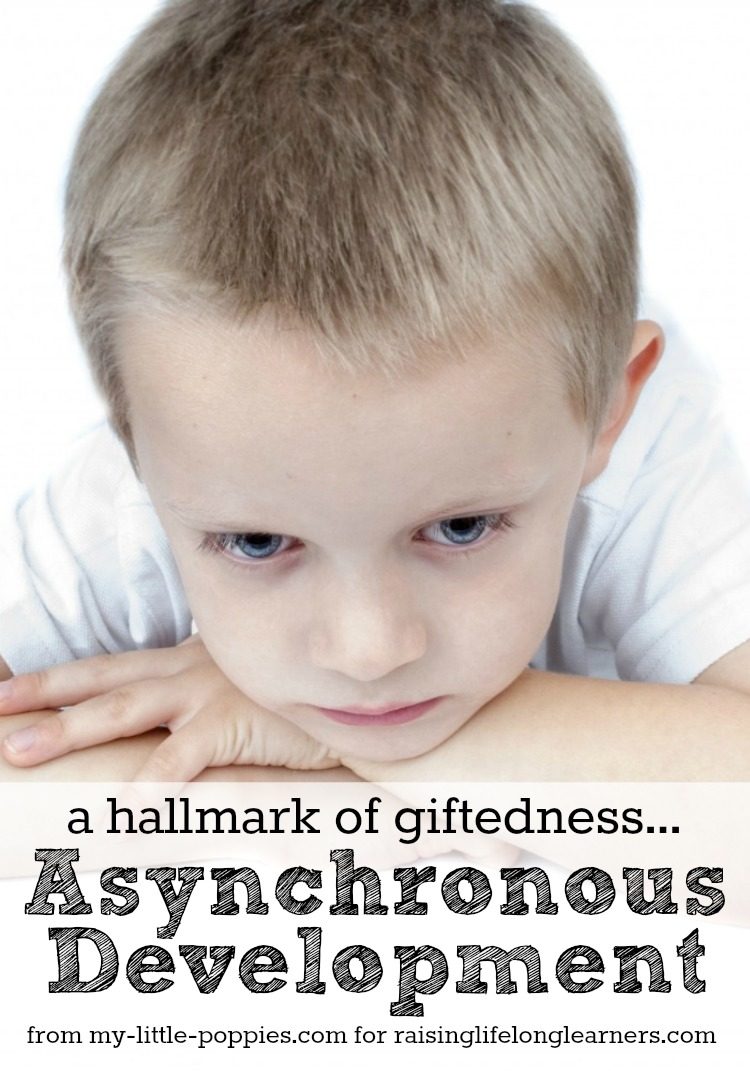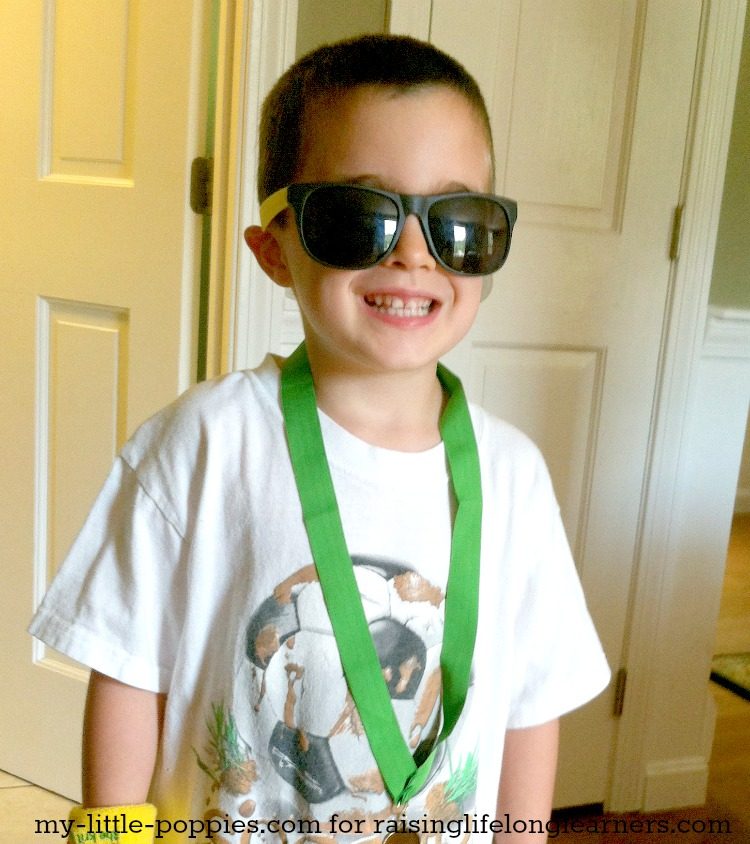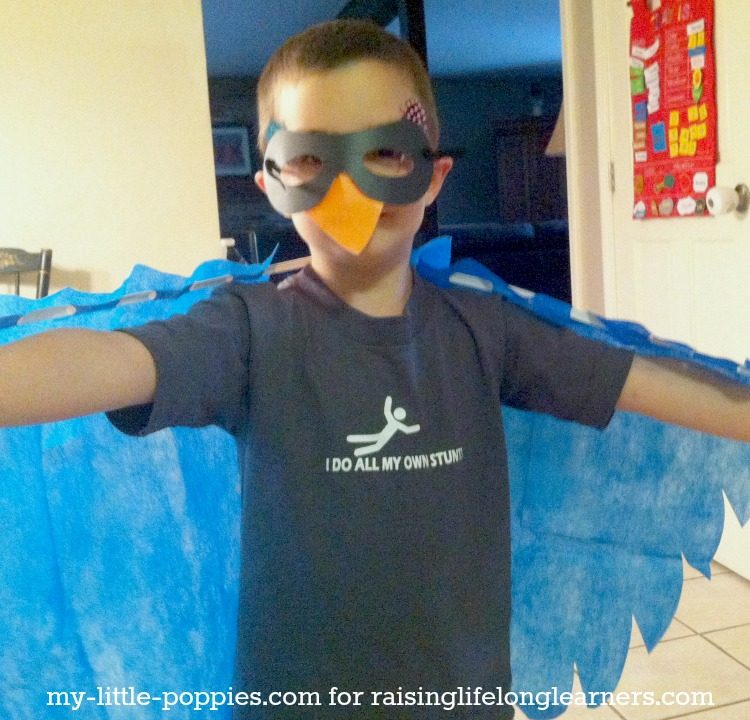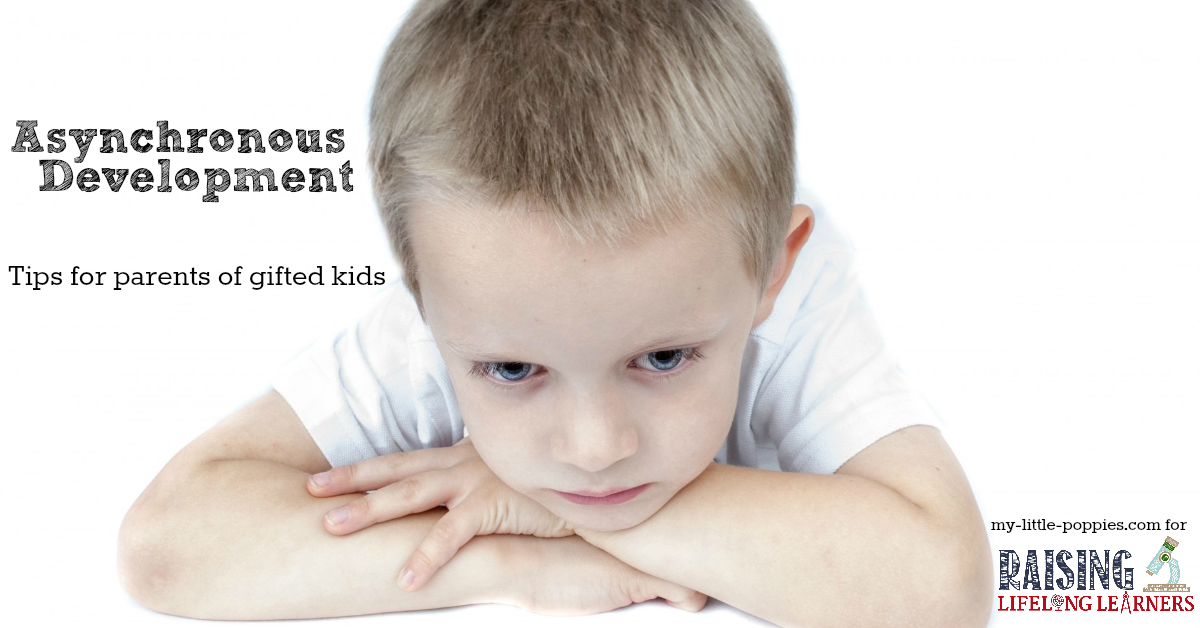Asynchronous Development in Gifted Children
When you’re parenting gifted or twice-exceptional kids, you often feel lost and alone — like nobody will ever truly get what you live on a day-to-day basis. I felt that way, and it’s one of the reasons I created RLL in the first place… I hoped to bring other parents of tough kids together — and to find my own community. I’m so thrilled to welcome one of my favorites to share a post with you today. Cait is the author of my-little-poppies, and is part of our community. She’s in the trenches with challenging kids, my friends, and she has so much to share. I’ll let her get to it…
My 7-year-old son, Leo, is twice-exceptional: profoundly gifted and learning disabled. As his mother, I often feel frustrated with the public’s understanding of giftedness. Far too many people equate giftedness with achievement. They assume that gifted children have it easier, that they have an advantage over their peers. These folks see gifted education as elite and unnecessary. I have little doubt that many of these misperceptions stem from the label itself: gifted. The label conjures up images of beautifully wrapped presents with neatly tied bows, images that are a stark contrast to the reality of giftedness: asynchrony.
Of all the definitions of giftedness that are floating around out there, my favorite is this one from the Columbus Group, because it touches upon giftedness as asynchrony:
Giftedness is asynchronous development in which advanced cognitive abilities and heightened intensity combine to create inner experiences and awareness that are qualitatively different from the norm. This asynchrony increases with higher intellectual capacity. The uniqueness of the gifted renders them particularly vulnerable and requires modifications in parenting, teaching and counseling in order for them to develop optimally. (The Columbus Group, 1991).
What is asynchronous development?
Asynchronous development is one of the hallmarks of giftedness. While most children develop in a relatively uniform manner, gifted learners are asynchronous in their development. And the more gifted the child, the more asynchronous that child may be. There can be huge differences between a gifted child’s physical, intellectual, social, and emotional development. A gifted child can have the intelligence of an adult with the social-emotional development of a child. It is often said that gifted children are “many ages at once”, they are quite literally out-of-sync.
What does asynchronous development look like in a child?
It looks like this guy, right here:
My son, Leo, could be the poster child for asynchronous development. Chronologically, he is 7-years-old. Physically, he looks like your average 7-year-old but we all know you can’t judge a book by its cover. We had Leo tested one year ago and results indicted that his cognitive abilities are above the 99.9th percentile. What that means is that, intellectually, he is functioning at a level more than twice his chronological age. Yet, socially and emotionally he is very much seven and – in some instances- he can act much younger. In certain situations, Leo appears unbelievably mature. At other times, however, he can throw a fit to rival that of any 2-year-old.
I could provide countless examples of Leo’s asynchrony on any given day.
- I could tell you about how toddler Leo would often get into squabbles with friends at play dates because his friends were not following the complicated rules he had created for their play.
- I could tell you about the time Leo, age 5, was playing with his friends and then stopped suddenly to comment about the beauty of a nearby garden trellis. “Guys! Look! Doesn’t that lattice-work remind you of a portcullis?”
- I could tell you about the time Leo finished The Hobbit at age six. He discussed the book in such detail and depth and yet he was unable to watch age-appropriate television programs because he was too sensitive to themes. Television terrified him for years.
- I could tell you about the time he and I had a heartfelt conversation about the impact of our town’s new housing developments on our local coyote population and then, twenty-four hours later, I was under-arming him out of a robotics event because he was unable to wait patiently for his turn to use the most popular robot.
- I could tell you how Leo paints better than most adults I know and yet he is unable to get through a homeschool assignment without losing half a dozen pencils. Last winter he painted this:
the very same month that he lost his sock from within his boot in four feet of snow.
- I could tell you how Leo is fascinated by the Bible and can recount passages in detail and discuss themes and content with great understanding and yet he is unable to sit quietly during mass and is the class clown of his religious education class.
- I could tell you how Leo is doing fourth grade math and yet cannot make it through dinner without spilling his beverage or falling out of his chair.
My favorite example of Leo’s asynchrony, however, is one I tell often. When Leo was 2-years-old, he was obsessed with dinosaurs- like so many 2-year-old boys. He talked about dinosaurs from sun up until sun down and we read every dinosaur book we could get our hands on. And then, one night, I found him sobbing in his bed, unable to sleep. I snuggled him in my arms and asked him to tell me what was wrong. “Mama,” he sobbed, “The dinosaurs are extinct and the scientists don’t know why. What if we all die, and become extinct for some unknown reason?!” At just two years old, he was petrified of mass human extinction and death. This is a perfect illustration of the huge divide between Leo’s cognitive skills and his emotions. Can you imagine how difficult it must have been for him to emotionally process his thoughts?
Tips for Parents of Asynchronous kids
Understand asynchronous development
- Familiarize yourself with asynchronous development in gifted children. Share this information with those close to your child: grandparents, coaches, teachers, etc.
- Become acquainted with your child’s “many ages”, his unique asynchronous development. Understand that asynchrony may not be normal for most children but it is a completely normal aspect of giftedness.
- Adjust your expectations. One of the most difficult things about having an asynchronous child is managing expectations- both your own expectations and those of others.
- I don’t know about you guys, but I often find myself getting frustrated with my son. He speaks like a mini-adult and can have amazing conversations. And yet, when frustrated or overwhelmed, he can dissolve into a mushy mess in seconds. I have to constantly remind myself of his asynchrony and think of Leo in terms of his many different ages.
- Other adults may expect too much too soon from gifted children. Many mistakenly assume that a gifted child will easily secure As in school and behave well in class. Giftedness and achievement are two entirely separate entities.
Think outside the box when it comes to your child’s education
- We live in a society that, sadly, values sameness. Those who are different, especially those children who are different, often face a harder road. Advocate for your child early and often.
- Meet your child where he is at, based on his current levels of development. Maybe your third grader is reading at a college level, doing seventh grade math, and writing at a second grade level. That’s okay. Allow your child to soar, but provide support for any areas of weaknesses.
- It can be difficult to find reading material for gifted children. Many are capable of reading at a high school or college level, but the themes and content of books may be too much for the child’s social-emotional level.
- It is challenging to educate asynchronous children in the public education setting. Think outside of that proverbial box! Your child may benefit from an alternative educational placement Acceleration, online learning, homeschooling, and even unschooling often work better for this population.
- Asynchrony is often displayed in a gifted child’s lagging executive functioning skills (attention, organization, behavior, and self-regulation skills). Your child may need additional support and scaffolding in this area.
Intellectual peers are important
Leo’s vocabulary and references are often years ahead of those of his peers. Remember my portcullis example above? It’s a perfect example of the divide that happens with gifted children and their age-mates. I’m Leo’s mother and I had to Google portcullis on my phone when it happened, folks. To this day, Leo and his younger siblings will create complicated play scenarios. One afternoon, they were Native Americans foraging for berries, building teepees, and hunting bison. Another afternoon, they were ancient Egyptians engaging in a mummification ritual, complete with sarcophagus. These games are certainly not typical of most 3, 5, and 7-year-olds.
- Remember that it is normal for gifted children to have difficulty relating to their peers. Your child may need social support and scaffolding.
- These kids need intellectual peers. Allow your child opportunities to interact with other gifted children.
- Provide opportunity for your child to interact with older children and adults. Find a mentor in your community.
Help your child work through and manage frustration
Your child’s asynchronous development is frustrating to deal with, isn’t it? Just imagine for a moment how incredibly frustrating it must be to be your child.
- Everyone has unique strengths and weaknesses. We all have things we are good at and things we need to work upon. Talk about this with your child and use your child’s passions to address weaknesses.
- Teach your child to manage frustration. Coping skills are among the most important of life skills.
- When the going gets rough, do not be afraid to seek help. When doing so, be sure to find care providers who specialize in gifted and twice exceptional learners.
Find a community
Parenting an asynchronous gifted child can be a lonely venture. Parents often feel that they cannot speak openly about their struggles for fear of being judged harshly. Find a community of parents and educators of similar children. Seek out these individuals both online and in your community. If you cannot find a local group, create one. I cannot tell you what a relief it is to be able to openly discuss these issues without fear of judgment. You are not alone.
I think of asynchronous development as the very essence of giftedness. Gifted children are not better than their peers, they are just different. And just like other populations that differ significantly from the norm, gifted children need support in order to thrive. I honestly believe that if the public understood giftedness as asynchrony, the gifted world would change for the better.
What are some examples of your child’s asynchrony? Leave a comment and tell us — we’d love to hear your stories.
Cait Fitz is a school psychologist and mom to three amazing little people. She chronicles her unexpected journey into homeschooling at My Little Poppies. Cait is also a contributor at Year Round Homeschooling. You can follow her on Facebook, Twitter, Pinterest, and Instagram.







